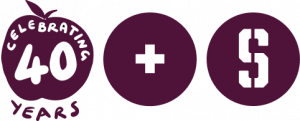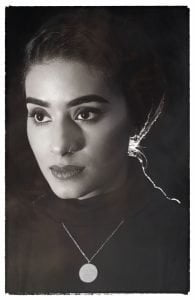“Poetry is like water, it takes on the vessel it’s in” Joelle Taylor (BBC Radio 4: Front Row – 11 Jan 22)
Apples and Snakes celebrate turning 40 in 2022, and with any significant anniversary comes a time of reflection. We have thought long and hard about how we came together, what we’ve achieved and where we would like to go next with spoken word and performance poetry.
We could name all the incredible poets we have nurtured and collaborated with over the years from the budding talent to the more established names … But this is not in the spirit of what we’re about.
Apples and Snakes is, and always will be, about recognising and celebrating the art form and appreciation for spoken word, striving to work with the individual and their circumstances and supporting talent to grow the industry.
To help put this project together, we are working with Colin Potsig. We have commissioned 12 photographic works as part of Behind The Words. Colin is a photographic artist based in Northumberland specialising in portraits and documentary photography, with a particular interest in marginalised people and places. His Arts Council funded exhibitions focusing on autistic people – “You, Me and Autism” and “You, Me and Autism Too” focused on portraits of fellow autistic adults. His recent commissions include projects from the Wellcome Trust, Unlimited and City Arts Nottingham.
Together with the eye of Colin, we wanted to show you what a poet ‘looks like’ and dismantle the idea that you need to fit a particular mould to become one.
This is what a poet looks like: #ThisIsAPoet.
Kate Fox
Kate Fox works mainly as a stand-up poet and as a broadcaster and speaker. As she points out on stage, if you say you’re a comedian who does poems, not many people will come and see you; whereas if you say you’re a poet who does comedy…still not many people will come and see you but at least you get Arts Council funding… S
She was written two comedy series called The Price of Happiness for Radio 4 about things she’s supposed to want but doesn’t and her current touring show “Where There’s Muck There’s Bras” about notable Northern women.
Kate is a gentle activist and campaigner for the voices of Northerners, the working class, women and the neurodiverse to be heard. For this reason, we asked her to write about what being a poet means to her, and how being neurodiverse has shaped the way she creates and interacts with the poetic community. Read her blog here.
 Tahmina Ali
Tahmina Ali
Tahmina is a British Bangladeshi, Newcastle based spoken word poet, creative freelancer and young mother. Poetry has been a significant tool in Tahmina’s life, it gave her a voice at a time where she felt voiceless. Now through her workshops Tahmina aims to pass on those very tools to others.
Parenthood is a life-changing experience for anyone and it can be challenging to understand your new identity without mourning who you used to be. Tahmina explores how becoming a mother has affected her writing, but also how writing became a way to rediscover herself. Her poetry has become a message for her daughter’s future, but also it was a way to cope with the loneliness that being a new parent can bring. Read the blog here.
Iroro Azanuwha

Iroro Azanuwha is a poet from Liverpool – His writing looks at the authentic self and parallels of what is seen and what is unseen. He uses poetry as a platform to communicate individual narratives, thus encouraging others to create their own narrative through words. He believes it is a key component in aiding healthy mental well-being.
Iroro is an emerging poet, someone who started writing later in life, and shares with us what made him put his words, ideas and thoughts down. This piece was written to share with you that each of us takes our own path to becoming a poet.
Tom Denbigh
 Tom lives in Bristol with an obscene number of books. Detailing the queer experience alongside tales of friends and strangers, Tom’s poems toy with myth, devilish humour, and absurdity to portray the bizarre and brilliant in the everyday. Outside of writing Tom has a PhD on roots and soil erosion and works in climate change science.
Tom lives in Bristol with an obscene number of books. Detailing the queer experience alongside tales of friends and strangers, Tom’s poems toy with myth, devilish humour, and absurdity to portray the bizarre and brilliant in the everyday. Outside of writing Tom has a PhD on roots and soil erosion and works in climate change science.
This piece is a lighthearted yet much-needed critique on the balance between poetry, spoken word, and comedy. Comedy is a useful tool for remaining humorous and positive in the light of trauma, so why does it appear to be valued less by the poetry scene? Tom gives us all a message, and it all starts with a poet walking into a bar.
Shirley May
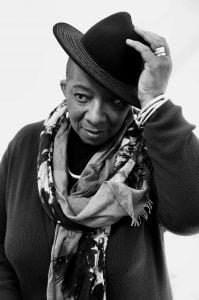 It’s fair to say that Young Identity has made it’s mark in Manchester – it’s been and still remains a pivotal place for many young and emerging voices in spoken word. Shirley May was one of the founders of this organisation and has dedicated her working career to poetry and the development of new and existing talent. In this blog piece, Shirley writes about the difficulties of getting such an organisation off the ground and the importance of finding like-minded individuals and community support to make such a group successful. If you’re thinking of creating your own cohort or collective, this piece is essential – especially if you are already a poet yourself, finding that work/life balance becomes critical.
It’s fair to say that Young Identity has made it’s mark in Manchester – it’s been and still remains a pivotal place for many young and emerging voices in spoken word. Shirley May was one of the founders of this organisation and has dedicated her working career to poetry and the development of new and existing talent. In this blog piece, Shirley writes about the difficulties of getting such an organisation off the ground and the importance of finding like-minded individuals and community support to make such a group successful. If you’re thinking of creating your own cohort or collective, this piece is essential – especially if you are already a poet yourself, finding that work/life balance becomes critical.
Ioney Smallhorne
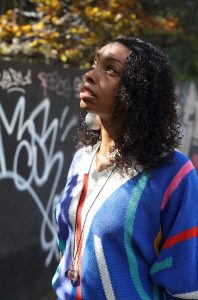 Ioney, performance poet, writer, educator, a Hyson Green, Nottingham native. Her artistic practice is ignited by her Jamaican heritage, fuelled by the Black British experience, and smoulders with womaness.
Ioney, performance poet, writer, educator, a Hyson Green, Nottingham native. Her artistic practice is ignited by her Jamaican heritage, fuelled by the Black British experience, and smoulders with womaness.
In this blog, she writes about the reality of balancing the books when it comes to starting out. She took on an unexpected role as a part time educator to help pay bills and settle demanding debts.
As a dyslexic and from a working class background, she never thought she would be the ‘type’ to be an educator. But working with young people, and later bumping into them and sharing memories, showed her that she has every right to be there and is making a huge impact. Maybe this is the right path for you too?
Shagufta K Iqbal

The world of commissions can be a complex place. The fees can be high but the cost even higher, especially when they book in endless meetings and don’t cover extensive travel fees. Maybe you finally got the yes, put your heart into it, only to be told you can never perform it to your audiences.
Getting the details up front, and knowing where you stand is vital for any commission. Shagufta shares tips and advice from her own experience about nailing that commission that works for you.
Founder of The YoniVerse Poetry Collective and Kiota Bristol, Shagufta K Iqbal longlisted for the Jerwood Compton poetry fellowship, is an award-winning writer, filmmaker, workshop facilitator and Tedx Speaker.
Christy Ku
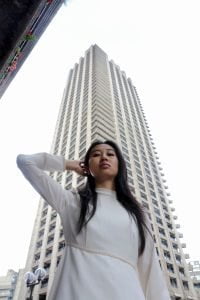
Christy is a Multimedia Creative. Poet. Actor. Workshop Facilitator. Photographer. Anti-Racism Consultant. She works across many different art forms, specialising in poetry, acting and performance, and workshop facilitation.
During Covid-19, racism towards East & South East Asian (ESEA) people increased, not just here in the UK but overseas as well. Corporations and organisations would look to Asian poets to explore this trauma, in a way that exposes their pain for the audience’s entertainment. Without a support and without promises to change the system that enabled this racism to take place.
Christy writes about the poetry network she has formed and shares her experience of British-based ESEA poet in a blog entitled: ‘I don’t you a trauma poem’.
Helen Seymour
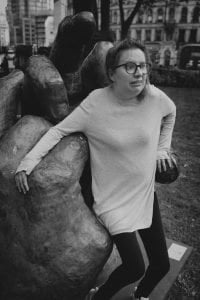 Being disabled is not a bad word. The word in itself holds a load of sterotypes and preconnotations. People who identify as disabled are often talked down to, expected to be something ‘less’ or an inconvenience. They’re asked to ‘prove it’ as if they owe you something.
Being disabled is not a bad word. The word in itself holds a load of sterotypes and preconnotations. People who identify as disabled are often talked down to, expected to be something ‘less’ or an inconvenience. They’re asked to ‘prove it’ as if they owe you something.
Helen is a word-artist-spoken-poet-human performance-person. Her work mainly focuses on health, hospitals + surrealism. She is known for mixing off-beat comedy with dark subject matters. Helen is a disabled artist who is proud to be contributing to a more diverse arts sector.
In this blog, she explores the world of poetry and wonky stages, cucumber sandwiches, and just getting on with it. She writes as herself, as someone who is actively trying to change the sector and make it easier for people to be who they are without having to make excuses for their access needs. If you have ever felt annoyed that you needed to do things differently, then do read on.
Read ‘Being a Disabled Poet’ here.
Edalia Day
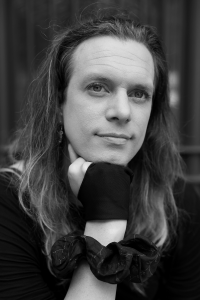 The pandemic was a difficult time for many. The arts world took a brutal hit as many freelancers and artists found themselves without work overnight for a very long and uncertain amount of time.
The pandemic was a difficult time for many. The arts world took a brutal hit as many freelancers and artists found themselves without work overnight for a very long and uncertain amount of time.
Out of this darkness came new opportunities to reapply or learn new skills. To pick up something different and try again by drawing on what you already know.
This piece is about combining different mediums and arts skillsets to make something new, something different from something that has already been there. Edalia Day combined poetry with animation, and enhanced her skills in drawing during the pandemic to create wonderful animated shorts.
As a neurodiverse poet, she realised drawing helped her to better understand and absorb the poetry shows she fell in love with. She shares tips on how you can learn these skills too and perhaps build the courage to forge new career opportunities.
Read ‘The Animated Poet‘ here.
Bohdan Piasecki
 Bohdan Piasecki is a poet from Poland based in Birmingham. A committed performer, he has taken his poems from the upstairs room in an Eastbourne pub to the main stage of the Birmingham Repertory Theatre, from underground Tokyo clubs to tramways in Paris, from a bookshop in Beijing to an airfield in Germany, from niche podcasts to BBC Radio. In the UK, he regularly features at the country’s most exciting spoken word nights, festivals, and readings. He enjoys the creative chaos of big field festivals just as much as the composed concentration of literary events.
Bohdan Piasecki is a poet from Poland based in Birmingham. A committed performer, he has taken his poems from the upstairs room in an Eastbourne pub to the main stage of the Birmingham Repertory Theatre, from underground Tokyo clubs to tramways in Paris, from a bookshop in Beijing to an airfield in Germany, from niche podcasts to BBC Radio. In the UK, he regularly features at the country’s most exciting spoken word nights, festivals, and readings. He enjoys the creative chaos of big field festivals just as much as the composed concentration of literary events.
In this blog, he writes about poetry and translation. How being multi-lingual affects his work but also how he reads and listens to other poems. Thinking, writing and speaking bits of language make up the whole meaning. But if those ‘bits’ are from different languages, where words sometimes don’t exist, or conjure up different meanings, the fragments of the whole can become something entirely different. The choice of ‘bits’ becomes wider. And we won’t always have to understand these bits to understand what someone is saying.
Read ‘Bits of a Poet’.
